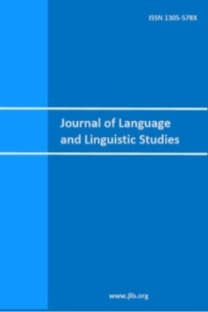Conceptualization of theory in English language teaching by student teachers and practicing teachers
Öz
Please fill up the following information accurately. (Please
use Times New Roman, 12 pt.
Conceptualization of theory in English language teaching by student teachers and practicing teachers
Anahtar Kelimeler:
Theory, Conceptualization, Language Teaching, Student Teachers
___
Allen, J. M. (2009). Valuing practice over theory: How beginning teachers re-orient their practice in the transition from the university to the workplace. Teaching and Teacher Education, 25(5), 647-654.Borg, S. (2006). Teacher cognition and teacher education: Research and practice. London: Continuum.
Borg, S. (2009). Language teacher cognition. In A. Burns & J. C. Richards (Eds.), The Cambridge guide to second language teacher education (pp. 163-171). New York: Cambridge University Press.
Carr, D. (2000). Professionalism and ethics in teaching. Abingdon: Routledge.
Creswell, J. W. (2013). Qualitative inquiry and research design. Choosing among five approaches. (3rd ed.) Thousand Oaks: Sage Publications.
Cummins, J., & Davison, C. (2007). International handbook of English language teaching. New York:Springer Science & Business Media.
Darling-Hammond, L. (2010). Teacher education and the American future. Journal of Teacher Education, 61(1-2), 35-47.
Dörnyei, Z. (2007). Research methods in applied linguistics: Quantitative, qualitative, and mixed methodologies. Oxford: Oxford University Press.
Emsheimer, P., & De Silva, N. L. (2011). Preservice teachers’ reflections on practice in relation to theories. In M. Mattsson & T. V. Eilertsen & D. Rorrison (Eds.), A practicum turn in teacher education (pp. 147-167). Rotterdam,The Netherlands: Sense Publishers.
Farrell, T. S. (2015). It’s not who you are! It’s how you teach! Critical competencies associated with effective teaching. RELC Journal, 46(1), 79-88.
Fenstermacher, G. D. (1994). The knower and the known: The nature of knowledge in research on teaching. Review of Research in Education, 20, 3-56.
Hascher, T., Cocard, Y., & Moser, P. (2004). Forget about theory—practice is all? Student teachers' learning in practicum. Teachers and Teaching, 10(6), 623-637.
Hobson, A. J., Ashby, P., Malderez, A., & Tomlinson, P. D. (2009). Mentoring beginning teachers: What we know and what we don't. Teaching and Teacher Education, 25(1), 207-216.
Johnson, K. E. (1996). The role of theory in L2 teacher education. TESOL Quarterly, 30(4), 765 771.
Knight, R. (2015). Postgraduate student teachers’ developing conceptions of the place of theory in learning to teach: ‘more important to me now than when I started’. Journal of Education for Teaching, 41(2), 145-160.
Krippendorff, K. (2004). Content analysis: An introduction to its methodology. Thousand Oaks, CA: Sage.
Kumaravadivelu, B. (2001). Toward a postmethod pedagogy. TESOL Quarterly, 35(4), 537-560.
Oonk, W. (2009). Theory-enriched practical knowledge in mathematics teacher education. ICLON, Leiden University, Leiden.
Pajares, M. F. (1992). Teachers’ beliefs and educational research: Cleaning up a messy construct. Review of Educational Research, 62(3), 307-332.
Pring, R. (2004). Philosophy of educational research. London: Continuum.
Richards, J. C., & Rodgers, T. S. (2001). Approaches and methods in language teaching. New York: Cambridge University Press.
Richardson, V. (1996). The role of attitudes and beliefs in learning to teach. In J. Sikula (Ed.), Handbook of Research on Teacher Education (pp. 102–119). New York: Macmillan.
Schon, D. A. (1983). The reflective practitioner: How professionals think in action. New York: Basic Books.
Segall, A. (2001). Re-thinking theory and practice in the preservice teacher education Classroom: teaching to learn from learning to teach. Teaching Education, 12(2), 225-242.
Shulman, L. (2004). The wisdom of practice. San Francisco, CA: Jossey Bass.
Sjølie, E. (2014). The role of theory in teacher education: reconsidered from a student teacher perspective. Journal of Curriculum Studies, 46(6), 729-750.
Thomas, G. (2007). Education and theory: Strangers in paradigms. New York: McGraw-Hill International.
Verloop, N., Van Driel, J., & Meijer, P. (2001). Teacher knowledge and the knowledge base of teaching. International Journal of Educational Research, 35(5), 441-461.
Yaman, Ş. (2008). A case study of an EFL teacher’s personal & professional development: Employing repertory grid elicitation technique. Boğaziçi University Journal of Education, 25(1), 25-40.
Zeichner, K. (2010). Rethinking the connections between campus courses and field experiences in college-and university-based teacher education. Journal of Teacher Education, 61(1-2), 89-99.
- ISSN: 1305-578X
- Yayın Aralığı: Yılda 4 Sayı
- Yayıncı: Hacettepe Üniversitesi
Sayıdaki Diğer Makaleler
ELT students’ attitudes and awareness towards the use of WEB 2.0 technologies for language learning
A suggested syllabus for creative drama course in ELT
Seçil HORASAN DOĞAN, Paşa Tevfik CEPHE
Conceptualization of theory in English language teaching by student teachers and practicing teachers
Fatma GÜMÜŞOK, Ayşegül DALOĞLU
Intertextuality in Albert Camus’s philosophy: “let us imagine Sisyphus happy”
